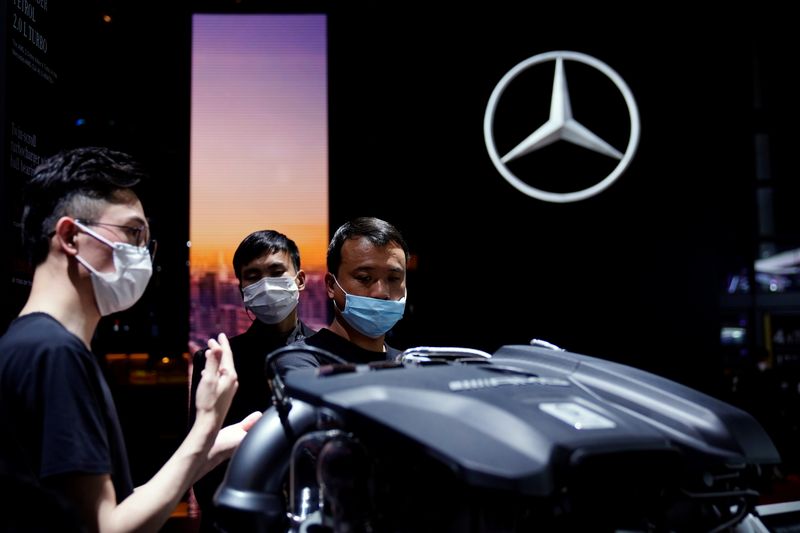By Nick Carey
LONDON (Reuters) -Mercedes-Benz car maker Daimler AG (DE:DAIGn) on Friday raised its profit outlook for 2021, but said the global semiconductor chip shortage may continue to impact sales in the second quarter.
Daimler (OTC:DDAIF) said it assumed there would be some recovery in chip availability in the second half of this year but there was limited visibility at present.
Chief Financial Officer Harald Wilhelm said underlying car demand was strong, but the chip shortage had prevented sales from reaching full potential.
Wilhelm, speaking on a conference call with analysts, said lost production would only be partially recovered by the end of 2021 and the carmaker would continue to allocate chips more to higher-end products while the shortage lasts.
Cars have become increasingly dependent on chips for everything from computer management of engines for better fuel economy to driver-assistance features such as emergency braking.
The chip shortage has forced a number of automakers to curtail production, including General Motors Co (NYSE:GM), Stellantis, Ford Motor (NYSE:F) Co and Daimler's German rival Volkswagen AG (OTC:VWAGY).
Earlier this week, Daimler cut working hours for up to 18,500 employees and said it would temporarily halt production at two plants in Germany due to the chip shortage.
But the German carmaker still expects its operating profit this year to be significantly above 2020 as the global economy recovers from the coronavirus pandemic.
Daimler now expects an adjusted margin from its Mercedes cars and van business of between 10% and 12%, up from its previous outlook of between 8% and 10%.
The company also raised its outlook for China, saying it expected more than 7.5% growth in 2021, up from its previous estimate of between 2% to 7.5%.
CFO Wilhelm told analysts sales in China so far in the second quarter were "just great" and the company could probably do even more if the chip shortage had not curtailed production.
Last week, Daimler said soaring Chinese demand for luxury Mercedes-Benz cars and higher prices drove a better-than-expected profit in the first quarter.
Mercedes-Benz sales rose 60% in China in the first quarter. Unable to travel abroad, wealthier Chinese consumers have used their disposable income to splash out on luxury items.
This week rival BMW also said first-quarter earnings received a strong bounce from sales in China and stronger pricing.
Chinese buyers helped to turn around 2020 for Daimler, BMW and Volkswagen (DE:VOWG_p), with sales rising in the second half of the year and offsetting weaker results in other regions.
Daimler last week unveiled the EQS, a sedan built on a dedicated electric vehicle platform, seen as a solid contender against market leader Tesla (NASDAQ:TSLA) Inc as electric car sales take off.

"I feel much more comfortable today than a year or two ago that we can accommodate the step-up of electric vehicles without too strong a margin dilution," CFO Wilhelm said when asked about earlier Daimler predictions that electric vehicles would not be as profitable as fossil-fuel models until the end of this decade.
"Are we at margin parity today? No, we're not," he said. "But we're making progress."
